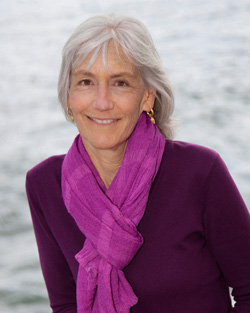Campus News
$1 million gift from alumna Julie Packard funds student programs at UCSC
UCSC has received a $1 million gift from alumna Julie Packard, executive director of the Monterey Bay Aquarium.

Julie Packard, Executive Director of the Monterey Bay Aquarium
UC Santa Cruz has received a $1 million gift from alumna Julie Packard, executive director of the Monterey Bay Aquarium. By establishing the Dean’s Fund for Diversity in the Sciences, Packard’s gift will support programs at UCSC that help underrepresented minority students excel in the sciences and mathematics.
The fund, administered by the dean of physical and biological sciences, will be used to amplify several existing programs that offer students intensive academic support, help transfer students from community colleges, expand opportunities for undergraduate research, and increase the number of students who can participate in the popular field courses.
“Our students work side by side with faculty and benefit from our renowned intensive field quarter courses. Julie Packard knows firsthand how valuable those experiences are, and I am deeply grateful for her generous gift, which will significantly expand the number and diversity of students who participate in these and other programs,” said Chancellor George Blumenthal.
Packard earned her bachelor’s and master’s degrees in biology at UCSC (B.A. 1974, M.A. 1978). She worked closely with biologist William Doyle, founding director of the Institute of Marine Sciences, both as an undergraduate and as a graduate student. Her gift is a major contribution to the Student Experience Initiative of the $300-million Campaign for UC Santa Cruz.
“I am grateful for the opportunities UCSC gave me as an undergraduate to spend time with top research scientists and be able to do science, not just hear about it,” Packard said. “I want my gift to help ensure that underrepresented students in the sciences are able to enjoy the same opportunities at UCSC that I did.”
UCSC’s science majors are an unusually diverse group relative to national comparisons, reflecting the changing demographics of California and the increasing diversity of the UCSC campus as a whole. UCSC also has an unusually good record of ensuring that students who major in the sciences earn degrees–20 percent better than the national average overall and nearly 40 percent better for underrepresented minority students.
Packard’s gift will benefit programs that have been crucial to UCSC’s success in building a large, diverse undergraduate student body in the sciences. The Academic Excellence (ACE) Program, for example, provides intensive academic support combined with peer mentoring and is dedicated to increasing the diversity of UCSC students earning bachelor’s degrees in science, technology, engineering, and mathematics (STEM) fields. UCSC’s Summer Research Institute, run by the STEM Diversity Office, currently trains students in biomedical lab research and helps them find positions in faculty research labs. The new funding will allow the program to expand beyond biomedical fields.
Lamat (Mayan for “star”) is a bridge program that brings star students from California community colleges to UCSC. Students get the opportunity to work with UCSC faculty and graduate students on computational astrophysics projects, learning a broad array of scientific skills. Additional funding will allow the program to serve more students and, for those who transfer to UCSC, will provide additional support spanning their time at UCSC.
The field quarter courses offered by the Department of Ecology and Evolutionary Biology are intensive immersion courses that train students how to conduct scientific research in the field. Additional sections will double the number of students who can take off-site field courses in marine ecology, kelp forest ecology, and arctic ecology.
Julie Packard has directed the Monterey Bay Aquarium since it opened in 1984. She serves on numerous boards, including the California Nature Conservancy, the Monterey Bay Aquarium Research Institute, and the David and Lucile Packard Foundation. She was a member of the Pew Oceans Commission, which in 2003 issued its recommendations for a comprehensive overhaul of national ocean policy, and she received the Audubon Medal for Conservation in 1998.
The Campaign for UC Santa Cruz provides critical resources to support the Student Experience and the other key initiatives in Genomics and Health, Coastal Sustainability, Data Science Leadership, and the Institute of the Arts and Sciences. In these initiatives and in each academic division, gifts support what education and research mean at UC Santa Cruz: bold, fearless inquiry that benefits our students, our community, and our planet.